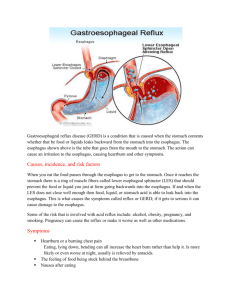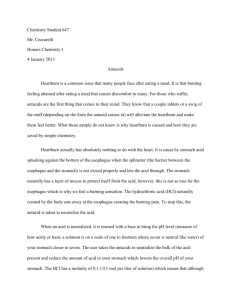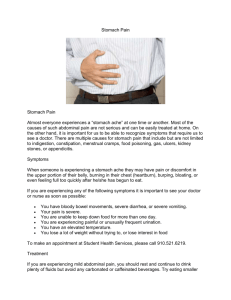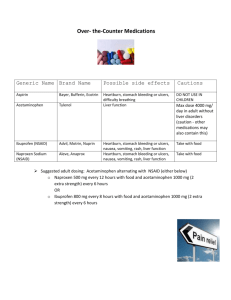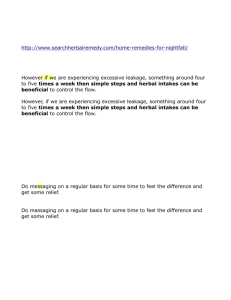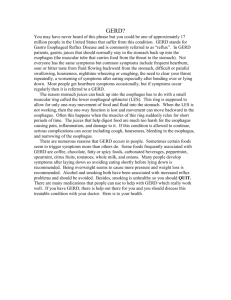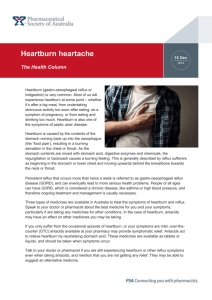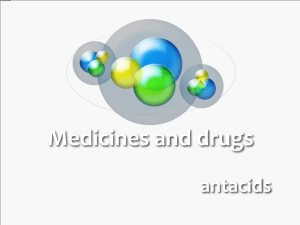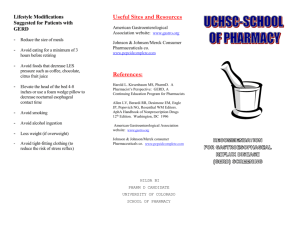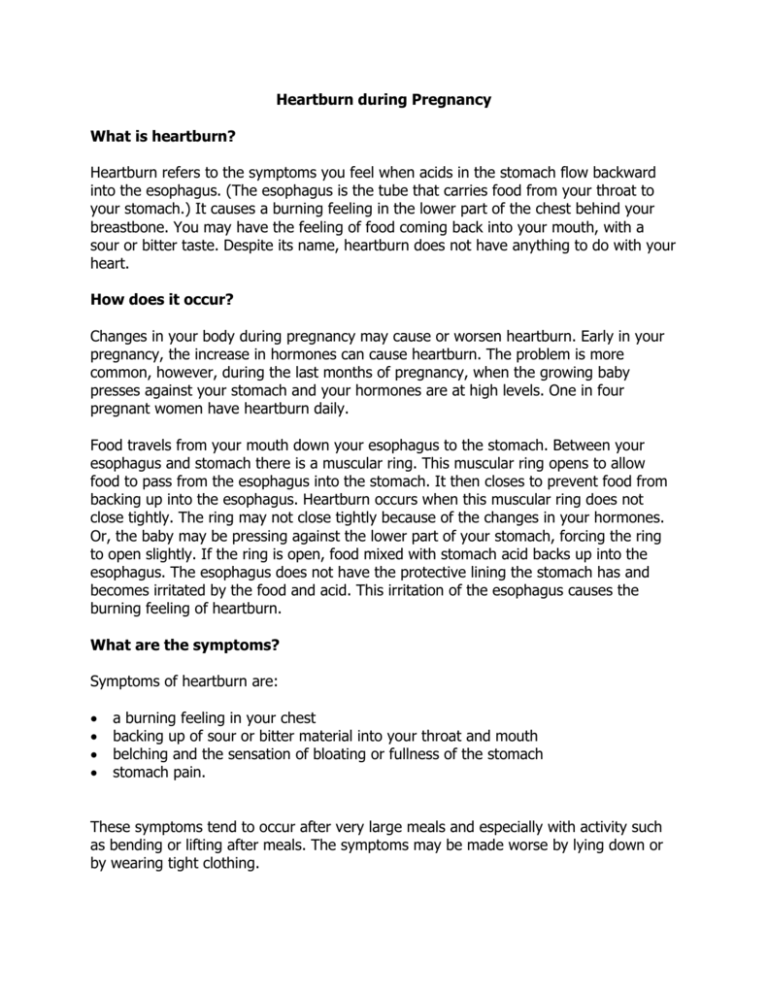
Heartburn during Pregnancy
What is heartburn?
Heartburn refers to the symptoms you feel when acids in the stomach flow backward
into the esophagus. (The esophagus is the tube that carries food from your throat to
your stomach.) It causes a burning feeling in the lower part of the chest behind your
breastbone. You may have the feeling of food coming back into your mouth, with a
sour or bitter taste. Despite its name, heartburn does not have anything to do with your
heart.
How does it occur?
Changes in your body during pregnancy may cause or worsen heartburn. Early in your
pregnancy, the increase in hormones can cause heartburn. The problem is more
common, however, during the last months of pregnancy, when the growing baby
presses against your stomach and your hormones are at high levels. One in four
pregnant women have heartburn daily.
Food travels from your mouth down your esophagus to the stomach. Between your
esophagus and stomach there is a muscular ring. This muscular ring opens to allow
food to pass from the esophagus into the stomach. It then closes to prevent food from
backing up into the esophagus. Heartburn occurs when this muscular ring does not
close tightly. The ring may not close tightly because of the changes in your hormones.
Or, the baby may be pressing against the lower part of your stomach, forcing the ring
to open slightly. If the ring is open, food mixed with stomach acid backs up into the
esophagus. The esophagus does not have the protective lining the stomach has and
becomes irritated by the food and acid. This irritation of the esophagus causes the
burning feeling of heartburn.
What are the symptoms?
Symptoms of heartburn are:
a burning feeling in your chest
backing up of sour or bitter material into your throat and mouth
belching and the sensation of bloating or fullness of the stomach
stomach pain.
These symptoms tend to occur after very large meals and especially with activity such
as bending or lifting after meals. The symptoms may be made worse by lying down or
by wearing tight clothing.
How is it diagnosed?
Your health care provider will ask about your medical history and symptoms. You will
probably not need to have any special tests.
How is it treated?
Your health care provider may ask you to do the following:
Eat 5 or 6 small meals of healthy foods instead of 2 or 3 large ones each day.
Sit with good posture when you are eating. Slouching can put extra pressure on
your stomach.
Do not eat, or eat less of, the following foods (they can cause the esophageal
muscle to relax and not close tightly):
coffee (caffeinated and decaffeinated)
carbonated drinks
very sweet foods or drinks such as syrups, honey, or liqueurs
tomato sauce and tomato paste
citrus juice, such as lemonade or orange and grapefruit juice
fatty or fried foods
chocolate
foods containing peppermint or spearmint
whole milk (skim milk is OK)
alcohol
spicy foods
red and black pepper and other spices.
Drink plenty of fluids between meals. Drink slowly. Drink no more than 1 cup with
meals. Fluid with food can overfill your stomach.
Wait an hour or longer after eating before you lie down. If you have to lie down
after a meal, lie on your left side. Keep your head and shoulders slightly higher than
the rest of your body.
Do not eat anything in the 2 to 3 hours before you go to bed. An empty stomach
produces less acid, so you are less likely to have heartburn while you sleep.
Raise the head of your bed or use more than 1 pillow so that your head and
shoulders are higher than your stomach when you lie down.
Chew gum or suck on hard candy to produce a flow of saliva. Saliva may help
control stomach acid. Do not chew or eat mint gum or candy.
Avoid tight clothes and belts.
If you have occasional heartburn after meals or at bedtime, your health care provider
may tell you to take a specific antacid. CAUTION: Don't start taking an antacid on your
own without first checking with your health care provider. Also, do not take baking soda
(sodium bicarbonate). It tends to make you hold fluid and swell.
How can I take care of myself?
Follow the treatment guidelines recommended above to help prevent heartburn.
If you are taking any medicine, ask your health care provider if it could be making
your heartburn worse.
Check with your provider about taking antacids. Taking an antacid 1 to 2 hours
before bed can help.
Stop smoking if you are a smoker. Cigarette smoking increases the acidity of your
stomach's contents. Smoking can also hurt your baby.
Talk to your provider if you do not get relief and your heartburn gets worse.
Women's Health Advisor 2006.4; Copyright © 2006 McKesson Corporation and/or one
of its subsidiaries. All Rights Reserved. Developed by McKesson Provider Technologies.
This content is reviewed periodically and is subject to change as new health information
becomes available. The information is intended to inform and educate and is not a
replacement for medical evaluation, advice, diagnosis or treatment by a healthcare
professional.

